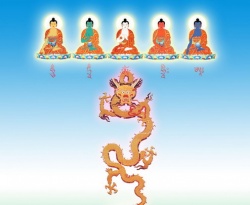Difference between revisions of "Tulpa"
(Created page with "thumb|250px| <poem> Tulpa (Tibetan: སྤྲུལ་པ, Wylie: sprul-pa; Sanskrit: निर्मित nirmita[1] and निर्मा...") |
|||
| (9 intermediate revisions by the same user not shown) | |||
| Line 1: | Line 1: | ||
| − | [[File:5 Dhyani Buddhas01.jpg|thumb|250px|]] | + | {{SeealsoDPL/button}} |
| + | [[File:5 Dhyani Buddhas01.jpg|thumb|250px|]]<nomobile>{{DisplayImages|3890|4060|2485}}</nomobile> | ||
| + | |||
| + | |||
| + | |||
| + | |||
| + | |||
| + | |||
| + | |||
<poem> | <poem> | ||
| − | Tulpa (Tibetan: སྤྲུལ་པ, Wylie: sprul-pa; Sanskrit: निर्मित nirmita | + | [[Tulpa]] ([[Tibetan]]: {{BigTibetan|[[སྤྲུལ་པ]]}}, [[Wylie]]: [[sprul-pa]]; [[Sanskrit]]: [[निर्मित]]; [[nirmita]]; and [[निर्माण]] [[nirmāṇa]]; "[[to build]]" or "[[to construct]]") is a {{Wiki|concept}} in [[mysticism]] of a being or [[object]] which is created through sheer [[discipline]] alone. |
| + | |||
| + | It is a [[materialized Thought]] that has taken [[physical Form]] and is usually regarded as {{Wiki|synonymous}} to a [[thought form]]. | ||
| + | |||
| + | [[Tibetan Buddhism]] | ||
| + | |||
| + | A [[tulpa]] is what is called in {{Wiki|Yiddish}} a [[golem]]. | ||
| + | |||
| + | It is a [[manifestation]] created by an {{Wiki|adept}} to [[accomplish]] a certain task or tasks. | ||
| + | |||
| + | |||
| + | "Once the [[tulpa]] is endowed with enough [[vitality]] to be capable of playing the part of a real {{Wiki|being}}, it tends to free itself from its maker's control . . . . [[Tibetan]] {{Wiki|magicians}} also relate cases in which the [[tulpa]] is sent to fulfill a [[mission]], but does not come back and pursues its peregrinations as a half-conscious, dangerously mischievous puppet. | ||
| + | |||
| + | The same thing, it is said, may happen when the maker of the [[tulpa]] [[dies]] before having dissolved it." | ||
| + | |||
| + | {{Wiki|Alexandra David-Neel}}, With {{Wiki|Mystics}} and {{Wiki|Magicians}} in [[Tibet]]. | ||
| + | |||
| + | [[Tulpa]] is a [[Spiritual]] [[discipline]] and teachings {{Wiki|concept}} in [[Tibetan Buddhism]] and [[Bon]]. | ||
| + | |||
| + | The term '[[thought]] [[form]]' is used as early as 1927 in {{Wiki|Evans-Wentz}} translation of the [[Tibetan Book of the Dead]], described as "giving palpable being to a [[visualization]], in very much the same [[manner]] as an {{Wiki|architect}} gives concrete expression in three {{Wiki|dimensions}} to [...] his blue-print". | ||
| + | |||
| + | [[John Myrdhin Reynolds]] in a note to his English translation of the [[Life]] story of [[Garab Dorje]] defines a [[tulpa]] thus: | ||
| − | + | A [[Nirmita]] ([[sprul-pa]]) is an {{Wiki|emanation}} or a {{Wiki|manifestation}}. | |
| − | + | A [[Buddha]] or other [[realized]] being is able to project many such [[Nirmitas]] simultaneously in an [[infinite]] variety of [[forms]]. | |
| − | + | The term is used in the works of {{Wiki|Alexandra David-Néel}}, who claimed to have created a [[tulpa]] in the image of a jolly Friar Tuck-like [[Monk]] which later developed a [[Life]] of its [[own]] and had to be destroyed. | |
| − | + | [[Thoughtform]] | |
| − | + | [[Thought-Form]] of the [[Music]] of Gounod, according to {{Wiki|Annie Besant}} and {{Wiki|C.W. Leadbeater}} in [[Thought]] [[Forms]] (1901) | |
| − | + | A [[thoughtform]] is the {{Wiki|equivalent}} {{Wiki|concept}} to a [[tulpa]] but within the {{Wiki|Western}} {{Wiki|occult}} [[tradition]]. | |
| − | + | The {{Wiki|Western}} [[understanding]] is believed to have originated as an [[interpretation]] of the [[Tibetan]] {{Wiki|concept}}. | |
| − | + | Its {{Wiki|concept}} is related to the {{Wiki|Western}} [[philosophy]] and practice of {{Wiki|magic}}. | |
</poem> | </poem> | ||
{{W}} | {{W}} | ||
[[Category:Buddhist Terms]] | [[Category:Buddhist Terms]] | ||
| − | [[Category: | + | [[Category:Local and mountain deities]] |
| + | [[Category:Thought]] | ||
Latest revision as of 08:23, 10 March 2016
Click here to see other articles relating to word Tulpa
Tulpa (Tibetan: སྤྲུལ་པ, Wylie: sprul-pa; Sanskrit: निर्मित; nirmita; and निर्माण nirmāṇa; "to build" or "to construct") is a concept in mysticism of a being or object which is created through sheer discipline alone.
It is a materialized Thought that has taken physical Form and is usually regarded as synonymous to a thought form.
Tibetan Buddhism
A tulpa is what is called in Yiddish a golem.
It is a manifestation created by an adept to accomplish a certain task or tasks.
"Once the tulpa is endowed with enough vitality to be capable of playing the part of a real being, it tends to free itself from its maker's control . . . . Tibetan magicians also relate cases in which the tulpa is sent to fulfill a mission, but does not come back and pursues its peregrinations as a half-conscious, dangerously mischievous puppet.
The same thing, it is said, may happen when the maker of the tulpa dies before having dissolved it."
Alexandra David-Neel, With Mystics and Magicians in Tibet.
Tulpa is a Spiritual discipline and teachings concept in Tibetan Buddhism and Bon.
The term 'thought form' is used as early as 1927 in Evans-Wentz translation of the Tibetan Book of the Dead, described as "giving palpable being to a visualization, in very much the same manner as an architect gives concrete expression in three dimensions to [...] his blue-print".
John Myrdhin Reynolds in a note to his English translation of the Life story of Garab Dorje defines a tulpa thus:
A Nirmita (sprul-pa) is an emanation or a manifestation.
A Buddha or other realized being is able to project many such Nirmitas simultaneously in an infinite variety of forms.
The term is used in the works of Alexandra David-Néel, who claimed to have created a tulpa in the image of a jolly Friar Tuck-like Monk which later developed a Life of its own and had to be destroyed.
Thoughtform
Thought-Form of the Music of Gounod, according to Annie Besant and C.W. Leadbeater in Thought Forms (1901)
A thoughtform is the equivalent concept to a tulpa but within the Western occult tradition.
The Western understanding is believed to have originated as an interpretation of the Tibetan concept.
Its concept is related to the Western philosophy and practice of magic.



